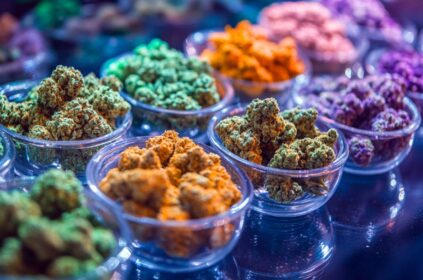Introduction
The world of hemp-derived cannabinoids is expanding at breakneck speed, giving rise to a fascinating array of products. Among these, Delta-10 and Delta-8 THC have captured the spotlight, emerging as intriguing alternatives to the more commonly known Delta-9 THC. As interest grows in these unique cannabinoids, it’s important to understand their market performance and consumer preferences. This article aims to provide clarity on these two cannabinoids, shedding light on their individual characteristics, market trends, and the reasons behind their surging popularity in the United States.
Market Performance
Growth and Sales
The numbers tell a compelling story: the market for hemp-derived cannabinoids has exploded in recent years. According to the Brightfield Group, sales shot up by a staggering 1,283% between 2020 and 2023, jumping from $200.5 million to nearly $2.8 billion. Within this booming landscape, Delta-8 THC commands the lion’s share, accounting for 44% of the market with an impressive $1.2 billion in sales. Conversely, while Delta-10 THC may not be leading the pack, its rising popularity is undeniable, indicating a growing interest among consumers.
Regulatory Environment
Navigating the market for these cannabinoids can be a challenge, largely due to the inconsistent state regulations that govern them. Unlike the closely monitored and licensed cannabis industry, hemp-derived THC products benefit from more relaxed regulations, allowing them to be sold in various venues—including gas stations and convenience stores. While this accessibility is a major factor fueling their growth, it raises valid concerns regarding consumer safety and product quality. Without proper oversight, consumers face the risk of purchasing products that may not meet safety standards.
Consumer Preferences
Effects and Uses
Delta-8 THC
Delta-8 THC has carved out a niche for itself as the milder counterpart to Delta-9 THC. Users frequently describe its effects as a pleasant blend of euphoria and relaxation. Here’s what you can typically expect:
- Relaxation and Relief: Many consumers turn to Delta-8 for its ability to provide relief from pain and inflammation, easing tension without overwhelming psychoactivity.
- Sleep and Appetite Stimulation: Users often report that Delta-8 assists with inducing sleepiness and increasing appetite, making it a favorite among those needing help with insomnia or eating disorders.
Delta-10 THC
On the other hand, Delta-10 THC offers a different kind of experience—one that is cerebral and uplifting. Ideal for consumers seeking a more energizing effect, here’s what you can likely anticipate:
- Focus and Creativity: Delta-10 tends to stimulate mental clarity and creative thinking, appealing to those who want a functional high.
- Less Psychoactive Effects: It’s generally regarded as a less intense alternative compared to Delta-8, meaning users experience fewer incidences of anxiety or paranoia.
Potency and Dosage
A fundamental distinction between Delta-8 and Delta-10 THC is their potency levels. Delta-8 is typically considered more potent, while Delta-10 offers a more subdued high. Here’s a breakdown:
- Delta-8 THC: Generally recognized for its strength, consumers often find it effective for more severe discomfort.
- Delta-10 THC: Because it is about half as potent as Delta-8, those who prefer a gentler experience may opt for Delta-10, even if it means consuming a larger quantity to feel its effects.
Health Benefits and Risks
Both Delta-8 and Delta-10 THC are praised for their potential health benefits, including relief from pain, anxiety reduction, and enhanced relaxation. However, it’s crucial to acknowledge the limitations of current research on these cannabinoids:
- Delta-8 THC: Studies indicate that Delta-8 may enhance the entourage effect when combined with CBD, potentially increasing therapeutic benefits for various conditions.
- Delta-10 THC: As a relatively newer player in the cannabis arena, comprehensive studies regarding the long-term effects of Delta-10 THC are still lacking.
Market Trends and Challenges
Accessibility and Regulation
The convenience of obtaining hemp-derived THC products has significantly boosted their popularity. However, as easy as it is to find them, consumers should be aware of the implications of buying unregulated products:
- Product Purity: The absence of stringent processing standards raises concerns about purity and safety. It’s important to ensure that any products purchased come with third-party testing information.
Competition with Traditional Cannabis
The rise of the hemp-derived THC sector poses an interesting challenge to the established state-regulated cannabis industry. Many consumers are drawn to the affordability and availability of these products, often without fully understanding the differences between hemp-derived THC and traditional cannabis. This has sparked ongoing debates about regulation, education, and safety standards.
Conclusion
In summarizing the landscape of Delta-8 and Delta-10 THC, a few key takeaways emerge:
- Market Growth: The demand for Delta-8 and Delta-10 THC has surged as consumers seek accessible alternatives to traditional THC.
- Consumer Preferences: Delta-8 is favored for its relaxing effects, while Delta-10 is preferred for its uplifting and energizing qualities.
- Regulatory Challenges: Navigating the lack of regulation is crucial for ensuring consumer safety and product quality.
- Health Benefits: Both cannabinoids hold promise for therapeutic use, but further research is necessary to fully understand their long-term effects.
Actionable Tips
- Choose Based on Needs: If you seek relaxation and pain relief, consider Delta-8. For a more invigorating experience, Delta-10 might be your go-to.
- Check Product Purity: Prioritize products from reputable brands that provide third-party lab test results to ensure quality and safety.
- Stay Informed: Be proactive in keeping up with the latest research and changes in regulations, as this knowledge will empower you to make informed decisions regarding your cannabinoid use.
As the hemp-derived cannabinoid market continues to grow, understanding the nuances between Delta-8 and Delta-10 THC will empower consumers to make choices that align with their individual needs and preferences.





















